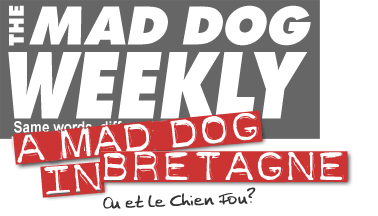| HOME Doggy Style Archive On the Road Holidays Doggy Style Blog Novel |

|

Part VIII |
||
Lunch is most often a cooked meal, much like our dinner except they don’t use a microwave. And yes, it’s standard fare to have wine with lunch, just like with all meals here including breakfast. |
The French
probably enjoy their food more than any other group of people in the world. To them eating
isn’t just a means of stoking the body with energy like it is in say, the United
States. It’s an integral part of their life. And judging by the dour look on their
faces, if it wasn’t for food they probably wouldn’t have much of a life at all. This is rather incredible, for the truth is French food is so wonderful they should be smiling all the time. After all, it’s never more than a few hours since they’ve had their last orgasm-inducing meal. And best of all, they didn’t have to wear a sensation dampening préservatif—what we call a condom—while they ate it, which, incidentally, you can buy from a machine outside any pharmacie in the country for 10FF ($1.65 as of this morning’s market opening). Even the simplest, most mundane meal here is wonderful. Contrast this with England—which I just visited last week, but more about that another day—where the average meal is a crime punishable by death in most civilized nations and the best meals are Indian. Breakfast in France is simple: a croissant, perhaps a pain au chocolat, and coffee. What more do you need? In the states this is commonly called a continental breakfast, which at the motels I stay in (which generally have a "6" in their name and include said breakfast in the price of the room) ends up to be day-old Krispy Kreme lard-filled doughnuts and a Styrofoam cup of the previous week’s well-aged bath water. I guess some things just don’t translate well. Lunch in France is, well, a little more elaborate than in the United States. Everything shuts down between noon and 2:30 (or 2h30 as they like to say here) except the restaurants, so people can go home for lunch. Now there’s a concept. You can’t go shopping, get groceries, or do anything but eat. Lunch is most often a cooked meal, much like our dinner except
they don’t use a microwave. And yes, it’s standard fare to have wine with lunch,
just like with all meals here. Except breakfast, of course. That’s why they invented
champagne. |
|
Pizza’s everywhere, and it has no relation to pizza as we know it. It’s a cracker-like crust with very little cheese. Or anything else for that matter. Think of a soggy Saltine covered in red nail polish. Getting hungry yet? |
Even the simplest
meal here includes more courses than the average American high school graduate took during
his or her 15 years of school. But you’re not really eating mass quantities of food,
it’s just that the French prefer to eat their food separately, one thing at a time.
Mixing food on a plate is, according to some versions, what started the French Revolution. Thus, everything becomes a course unto itself: appetizer, fish, olives, meat, vegetable, salad, cheese, fruit. When they eat cereal for breakfast they serve the cereal first, then the milk, then the sugar. If you’re having it with fruit you end up with a four-course breakfast. Contrast this with the English, who mix everything together, as typified by such culinary delights as Steak and Kidney and Potato and Rubber Boot and Dead Man’s Arm Pie, which as you’d expect is customarily eaten in a very dark pub after four or five pints of Guinness. Their pint, by the way, is equivalent to our keg. Well, as far as the strength of the beer is concerned anyway. Here’s an example: One night Vincent and I were going to go out for dinner when his mother said we should come over there since she’d bought a pizza at the marché that day. The idea of sitting around chowing down on a pizza sounded like a damned good idea, what with all the crappy choucroute garnie, moules, pâté, coquilles Saint-Jacques, and other fancy-ass stuff I’d been forcing myself to eat day in and day out. In typical French fashion we ended up with a seven-course meal, the small slice of very thin pizza being the least of it all. Interestingly, pizza’s everywhere, and it has no relation
to pizza as we know it in the states. It’s a cracker-like crust with very little
cheese. Or anything else for that matter. Think of a soggy Saltine covered in red nail
polish. Getting hungry yet? I need to get to Italy so I can find out how they make pizza.
I suspect it’s unlike any I’ve ever eaten. Then again, so is the French version. |
|
| Among the more common pâtes are foie gras, which is made from goose liver; l’ail, which is loaded with garlic; and lapin, which is made from cute cuddly dead little bunny wabbits named Fluffy. |
For some reason,
though, pizza is the excuse for a lot of meals. I went upstairs to Paul and Mirèn’s
one night for an impromptu dinner and it too revolved around pizza. Well, in a way.
Considering we had smoked salmon with blini and herbed crème fraiche,
shrimp with homemade mayonnaise (she whips it up in small batches for a meal like
we’d open a can of peas, only quicker), a little sliver of pizza, a salad of mixed
greens like those you find in the gourmet section of an American supermarket with a
mortgage application attached so you can pay for it, a plate full of assorted cheeses,
coffee, and strawberries with chantilly (whipped cream). Oh yeah, and two wines and
several kinds of baguette. Is it any wonder I’m convinced I’m going to return a fat alcoholic? A few final facts about food in France. First, there are subtle differences in words that can cause major problems if you’re not careful. Pâté and pâte are two different things. The first is the famous loaf that comes in more styles than Hillary’s hair. Among the more common are foie gras, which is made from goose liver; l’ail, which is loaded with garlic; lapin, which is made from cute cuddly dead little bunny wabbits named Fluffy; and pâté de campagne which has some of everything in it. Hey, the butcher has to do something with all the bits of meat that fall on the floor during the day. Pâte, on the other hand, is pasta. The easiest way to
remember the difference is to order pâté avec boules de boeuf once and try to
choke down liver loaf with meat balls and marinara sauce. You won’t make that mistake
again. |
|
The other day I’m sitting around thinking about all of this while eating my croissant frites for breakfast when I come up with the idea that will make me rich beyond my wildest dreams, and I’ve had some pretty wild dreams. |
Next, no matter
what you order in a restaurant, you get frites with it. Frites are French
fries. It would be silly if they called them French fries here because, well, we’re
in France. Only in the United States do we name food after ourselves, the most well known
being American cheese, which is so named so as to warn you that it’s not really
cheese at all. In most languages the words "American" and "artificial"
are the same thing. Speaking of things named American, be careful if you go into a restaurant here and order something with sauce américaine. It’s not American at all. It’s made with white wine, brandy, tomatoes, and spices, all ingredients most American kitchens have never seen. Except the tomatoes of course, but that’s if you count the three-gallon bottle of ketchup in the frig. Sauce américaine is used in a number of dishes, lobster being the most well known. The name, it turns out, was created as a joke since they think the favored sauce of most Americans is tarter sauce. Hah! Shows how much they know. It’s actually the secret one slathered on the Big Mac. So the other day I’m sitting around thinking about all of this while eating my croissant frites for breakfast (note that it’s never "something and frites", it’s just "something frites") when I come up with the idea that will make me rich beyond my wildest dreams, and I’ve had some pretty wild dreams. (Even discounting the ones that include me, Jennifer Lopez, and a five gallon can of olive oil.) The French are depressed, right? And they love their frites, right? So my idea is simple: I’ll open a chain of Prozac frites stands across the country and clean up! People will smile! Children will be laughing in the streets! There will be a monument to me at the entrance to every city, town, village, and burg throughout the country with the inscription: Chien Fou
*He came, he saw, he cured us!
©1999 Mad Dog Productions, Inc. All
Rights Reserved.
|
|
|
|||
|
|

